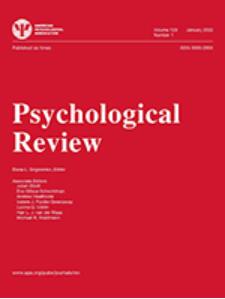求助PDF
{"title":"更正Sarin和Cushman(2024)的“一个想法太少:惩罚疏忽的适应性理由”。","authors":"","doi":"10.1037/rev0000539","DOIUrl":null,"url":null,"abstract":"<p><p>Reports an error in \"One thought too few: An adaptive rationale for punishing negligence\" by Arunima Sarin and Fiery Cushman (<i>Psychological Review</i>, 2024[Apr], Vol 131[3], 812-824). In the original article, the copyright attribution was incorrectly listed, and the Creative Commons CC BY license disclaimer was incorrectly omitted from the author note. The correct copyright is \"© 2024 The Author(s),\" and the omitted disclaimer is present as: Open Access funding provided by University College London: This work is licensed under a Creative Commons Attribution 4.0 International License (CC BY 4.0; http://creativecommons.org/li censes/by/4.0). This license permits copying and redistributing the work in any medium or format, as well as adapting the material for any purpose, even commercially. (The following abstract of the original article appeared in record 2024-74001-001). Why do we punish negligence? Some current accounts raise the possibility that it can be explained by the kinds of processes that lead us to punish ordinary harmful acts, such as outcome bias, character inference, or antecedent deliberative choices. Although they capture many important cases, these explanations fail to account for others. We argue that, in addition to these phenomena, there is something unique to the punishment of negligence itself: People hold others directly responsible for the basic fact of failing to bring to mind information that would help them to avoid important risks. In other words, we propose that at its heart negligence is a failure of thought. Drawing on the current literature in moral psychology, we suggest that people find it natural to punish such failures, even when they do not arise from conscious, volitional choice. This raises a question: Why punish somebody for a mental event they did not exercise deliberative control over? Drawing on the literature on how thoughts come to mind, we argue that punishing a person for such failures will help prevent their future occurrence, even without the involvement of volitional choice. This provides new insight on the structure and function of our tendency to punish negligent actions. (PsycInfo Database Record (c) 2025 APA, all rights reserved).</p>","PeriodicalId":21016,"journal":{"name":"Psychological review","volume":" ","pages":"153"},"PeriodicalIF":5.8000,"publicationDate":"2025-01-01","publicationTypes":"Journal Article","fieldsOfStudy":null,"isOpenAccess":false,"openAccessPdf":"","citationCount":"0","resultStr":"{\"title\":\"Correction to \\\"One thought too few: An adaptive rationale for punishing negligence\\\" by Sarin and Cushman (2024).\",\"authors\":\"\",\"doi\":\"10.1037/rev0000539\",\"DOIUrl\":null,\"url\":null,\"abstract\":\"<p><p>Reports an error in \\\"One thought too few: An adaptive rationale for punishing negligence\\\" by Arunima Sarin and Fiery Cushman (<i>Psychological Review</i>, 2024[Apr], Vol 131[3], 812-824). In the original article, the copyright attribution was incorrectly listed, and the Creative Commons CC BY license disclaimer was incorrectly omitted from the author note. The correct copyright is \\\"© 2024 The Author(s),\\\" and the omitted disclaimer is present as: Open Access funding provided by University College London: This work is licensed under a Creative Commons Attribution 4.0 International License (CC BY 4.0; http://creativecommons.org/li censes/by/4.0). This license permits copying and redistributing the work in any medium or format, as well as adapting the material for any purpose, even commercially. (The following abstract of the original article appeared in record 2024-74001-001). Why do we punish negligence? Some current accounts raise the possibility that it can be explained by the kinds of processes that lead us to punish ordinary harmful acts, such as outcome bias, character inference, or antecedent deliberative choices. Although they capture many important cases, these explanations fail to account for others. We argue that, in addition to these phenomena, there is something unique to the punishment of negligence itself: People hold others directly responsible for the basic fact of failing to bring to mind information that would help them to avoid important risks. In other words, we propose that at its heart negligence is a failure of thought. Drawing on the current literature in moral psychology, we suggest that people find it natural to punish such failures, even when they do not arise from conscious, volitional choice. This raises a question: Why punish somebody for a mental event they did not exercise deliberative control over? Drawing on the literature on how thoughts come to mind, we argue that punishing a person for such failures will help prevent their future occurrence, even without the involvement of volitional choice. This provides new insight on the structure and function of our tendency to punish negligent actions. (PsycInfo Database Record (c) 2025 APA, all rights reserved).</p>\",\"PeriodicalId\":21016,\"journal\":{\"name\":\"Psychological review\",\"volume\":\" \",\"pages\":\"153\"},\"PeriodicalIF\":5.8000,\"publicationDate\":\"2025-01-01\",\"publicationTypes\":\"Journal Article\",\"fieldsOfStudy\":null,\"isOpenAccess\":false,\"openAccessPdf\":\"\",\"citationCount\":\"0\",\"resultStr\":null,\"platform\":\"Semanticscholar\",\"paperid\":null,\"PeriodicalName\":\"Psychological review\",\"FirstCategoryId\":\"102\",\"ListUrlMain\":\"https://doi.org/10.1037/rev0000539\",\"RegionNum\":1,\"RegionCategory\":\"心理学\",\"ArticlePicture\":[],\"TitleCN\":null,\"AbstractTextCN\":null,\"PMCID\":null,\"EPubDate\":\"2025/1/13 0:00:00\",\"PubModel\":\"Epub\",\"JCR\":\"Q1\",\"JCRName\":\"PSYCHOLOGY\",\"Score\":null,\"Total\":0}","platform":"Semanticscholar","paperid":null,"PeriodicalName":"Psychological review","FirstCategoryId":"102","ListUrlMain":"https://doi.org/10.1037/rev0000539","RegionNum":1,"RegionCategory":"心理学","ArticlePicture":[],"TitleCN":null,"AbstractTextCN":null,"PMCID":null,"EPubDate":"2025/1/13 0:00:00","PubModel":"Epub","JCR":"Q1","JCRName":"PSYCHOLOGY","Score":null,"Total":0}
引用次数: 0
引用
批量引用

 求助内容:
求助内容: 应助结果提醒方式:
应助结果提醒方式:


